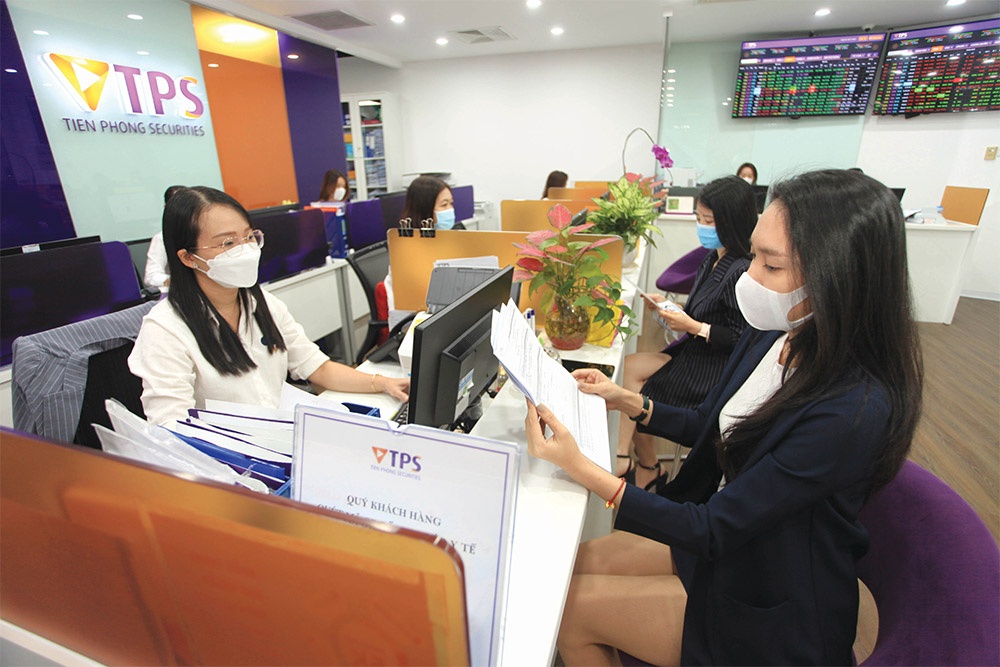Stock market can become noteworthy regional entity
 |
| Stock market can become noteworthy regional entity |
Johan Nyvene, chairman of Ho Chi Minh City Securities (HSC), emphasised the shifting perception of Vietnam’s stock market during a major conference on market upgrades last week.
“Despite global classifications placing Vietnam in the Frontier Market category, there is a growing recognition among foreign investors that Vietnam’s domestic stock market is emerging as a noteworthy player,” he said.
Yoon Sang Key, the South Korean Embassy to Vietnam’s commercial attaché in Vietnam, meanwhile stressed the market’s vital role in providing stable, long-term capital for business development, a feature distinct from traditional bank loans.
“The Vietnamese stock market not only enhances the prosperity of its citizens by allowing stock investors to increase their asset value through rising stock prices but also offers bond investors higher returns compared to bank savings,” Key stated.
He also believed that pension funds investing in stocks and bonds generate substantial profits, which are then distributed to citizens as pension income, supporting those planning for retirement to engage in long-term investment funds.
Key proposed recommendations for the development of stock market, emphasising the need for market expansion. This includes diversifying the listed stocks on the Ho Chi Minh Stock Exchange (HSX) by transitioning Unlisted Public Company Market (UPCoM) stocks to the platform. Currently, half of UPCoM’s market capitalisation is in the industrial goods/services as well as food and beverage sectors, while the banking and real estate sectors predominantly occupy HSX’s market cap.
Nguyen Viet Quang, CEO of Vingroup, noted that the company has been a frontrunner in Vietnam’s stock exchange. The conglomerate, housing VinFast, Vinhomes, and Vincom Retail, is listed on HSX with a market capitalisation of over $17 billion.
“Vingroup has effectively raised billions of US dollars through both the Vietnam and international stock markets. However, the local authorities should consistently review and refine current legal framework. As part of promoting market development, we strongly support exploring and implementing new financial product regulations to attract investors,” he said.
Strategies for an ascent
Nyvene of the HSC proposed crucial enhancements for the Vietnamese stock market.
“Firstly, we recommend removing restrictions on foreign limit ownership (FOL) ratio in Vietnamese companies. Secondly, revising or eliminating the pre-trading deposit requirements, especially for foreign institutional investors, would enhance the appeal for them and contribute to bringing Vietnam’s market upgrade closer to reality. We are actively working to find solutions and are confident in the high success potential of achieving this in the near future,” Nyvene said.
In addressing the coordination required between financial institutions and regulatory bodies, Nyvene stated, “The collaboration and alignment between these institutions, managing, supporting, and regulating foreign investors’ depository and investment accounts, will soon overcome this hurdle.”
To increase the supply of stocks for foreign investors, Yoon Sang Key of the South Korean Embassy believed that easing FOLs through non-voting depository receipts is feasible. This move aligns with the state management objectives for each industry, alongside facilitating listings for startups and foreign-invested enterprises to enhance market diversity,
“On the demand side, encouraging banks and insurance companies to invest in stocks, promoting asset management strategies with diversified and high returns, is crucial. The introduction of a public equity system to distribute shares of reputable state-owned enterprises at lower prices aims to foster citizens’ asset growth. Implementing pension funds is also advised to encourage long-term investment planning for retirement,” he said.
Moreover, regular investor relations conferences should be held to continuously showcase Vietnam’s reputable companies to foreign investors. Upgrading infrastructure and trading systems is essential for safely processing various orders, including stocks, futures, and options, in large volumes, Key added.
Disclosure advances
Ketut Ariadi Kusuma, senior financial sector specialist at the World Bank, said that Vietnam’s stock market upgrade could attract up to $25 billion in new investment from international investors to the Vietnamese market by 2030, provided certain conditions are met.
“Firstly, Vietnam needs to be upgraded by both international index providers, FTSE Russell and MSCI. We appreciate and agree with the current approach of prioritising an upgrade to an emerging secondary market by FTSE Russell. However, it is crucial to acknowledge that a substantial portion of new investment will come from an upgrade by MSCI,” he said.
Secondly, addressing issues related to the FOL and continuing the equitisation of large state-owned enterprises is vital. Solutions include improving disclosure, increasing access to stocks that have reached their FOL, and most importantly, raising the cap.
“If the cap remains a constraint, Vietnam could only attract a maximum net flow of $5 billion, as the market would then account for less than 1 per cent of the global emerging market index. However, if the FOL issue is fully resolved, Vietnam’s proportion in the index could increase to more than 1 per cent, potentially attracting an additional $8-15 billion,” Kusuma explained.
Thirdly, a healthy global investment environment is essential for Vietnam to enjoy the natural growth of global investment into emerging markets, estimated at 7 per cent per year. This could mean an additional $8-12 billion in investment by 2030.
Kusuma also noted the importance of developing a domestic investor base to accompany and balance the influx of foreign investment.
“Diversification of investments by Vietnam Social Insurance (VSS) into corporate securities not only makes the investment fund more effective in the long term but also expands the investor base and helps stabilise and develop the domestic capital market,” he explained. “A modest allocation to corporate securities by VSS could mean billions of US dollars in funding for the corporate sector. Comprehensive pension reforms could bring new investments of up to $25 billion into the corporate sector by 2030.”
Furthermore, reforms in the insurance and investment fund sectors, if implemented correctly, could bring an additional $28 billion to the corporate sector through the capital market, Kusuma added, estimating the potential for new mobilisation for the capital market at $78 billion.
Luu Trung Thai, chairman of MB, also stated the importance of augmenting capital inflow and raising market standards while underscoring the need to enhance the quality of listed companies.
“With substantial market values, foreign investors are more likely to pursue profitable investment opportunities,” shared Thai. “Hence, market quality and the integrity of central counterparty clearing are a focal point in the upgrade process, as both the FTSE and MSCI consider it a crucial aspect in the upgrade.”
Chairwoman of the State Securities Commission Vu Thi Chan Phuong mentioned that the commission is collaborating with market entities to address obstacles in the upgrade of the Vietnamese stock market.
“This year, the commission continues to implement solutions to remove barriers, attracting more indirect foreign investment and aiming towards an upgrade,” stated Phuong.
| Dominic Scriven, chairman, Dragon Capital
Currently, the stock market serves three major functions in capital provision. Firstly, it functions as a vital conduit between finance and enterprises. The government not only issues government bonds but also repurchases them to regulate the state budget’s capital source. The capital market provides long-term and medium-term funding, distinguishing itself from commercial banks, primarily offering short-term funds, and, most importantly, it facilitates funding for private entities. The solutions for developing the stock market include continuous infrastructure development, establishing a robust market ecosystem. Notably, expanding the network of organised investors in Vietnam is imperative. As Vietnam’s capital market remains the most dynamic in the region, there’s an ongoing need for expansion. Secondly, controlling market volatility involves constantly reinforcing trust in the stock market, especially investor confidence. Thirdly, it involves specificity. The topic of upgrading Vietnam’s stock market, strongly advocated by Dragon Capital, hinges on the timely establishment of a central counterparty clearing centre. Failure to implement this would necessitate addressing the restructuring issue concerning foreign investors. If implemented, there is an urgent need to explore and pilot non-voting depository receipts. Lastly, collaborative research and the promotion of Vietnam’s financial centre development emerge as pivotal. This vista presents a golden opportunity for the country to carve its niche in the global financial landscape. |
 | South Korean diplomat outlines strategies to enhance Vietnam's stock market In a conference on February 28 to outline the objectives for the development of Vietnam's securities market in 2024, Sang Key Yoon, Commercial Counsellor at the Embassy of South Korea in Vietnam, detailed a vision for bolstering the Vietnamese stock exchange. |
What the stars mean:
★ Poor ★ ★ Promising ★★★ Good ★★★★ Very good ★★★★★ Exceptional
Related Contents
Latest News
More News
- Banking sector targets double-digit growth (February 23, 2026 | 09:00)
- Private capital funds as cornerstone of IFC plans (February 20, 2026 | 14:38)
- Priorities for building credibility and momentum within Vietnamese IFCs (February 20, 2026 | 14:29)
- How Hong Kong can bridge critical financial centre gaps (February 20, 2026 | 14:22)
- All global experiences useful for Vietnam’s international financial hub (February 20, 2026 | 14:16)
- Raised ties reaffirm strategic trust (February 20, 2026 | 14:06)
- Sustained growth can translate into income gains (February 19, 2026 | 18:55)
- The vision to maintain a stable monetary policy (February 19, 2026 | 08:50)
- Banking sector faces data governance hurdles in AI transition (February 19, 2026 | 08:00)
- AI leading to shift in banking roles (February 18, 2026 | 19:54)


 Tag:
Tag:



















 Mobile Version
Mobile Version